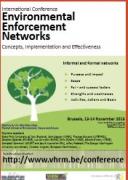
Environmental regulation enforcement officials and researchers from around the world met in Brussels on 13 – 14 November to examine the actions and benefits of working together to improve effectiveness in the fight against environmental crime. The conference attracted officials from enforcement authorities, government representatives, judges, prosecutors and researchers with a common aim of sharing strategies and establishing better operational communications between organisations.
The Flemish High Council of Environmental Enforcement in partnership with the International Network for Environmental Compliance and Enforcement (INECE) organised the conference “Environmental Enforcement Networks - Concepts, Implementation and Effectiveness.” The event was co-organised by EFFACE partner Michael Faure of the Maastricht European Institute for Transnational Legal Research (METRO). Mr. Faure stressed in his presentation the importance of more open communication, and for measuring the effectiveness of enforcement by examining benchmarks of progress from around the world.
Conference participants included actors from Europe, Australia, China, Africa, the United States and Chile. Speakers shared their applied local experience in general sessions and thematic workshops. A call for co-ordinated action resonated among participants over both days from a quote that was highlighted by Kenneth Markowitz, Managing Director of INECE, “We need networks that do, not networks that are.” The EFFACE research project investigates, among other topics, relevant actors and instruments in combating environmental crime and how effective they are – networks are an important aspect in this regard.
Grazia Maria Vagliasindi of University of Catania presented a paper from her work in EFFACE that highlight strengths and weaknesses of environmental enforcement and compliance networking in Italy. Her research analyses cases of effectiveness in networking as well as examples of lack of compliance and coordination regarding environmental criminal provisions enforcement.
At the European level, prominent enforcement networks are the EU Network for the Implementation and Enforcement of Environmental Law (IMPEL), the recently-established European Network of Prosecutors for the Environment and the European Union Forum of Judges for the Environment.
More information can be found at the conference website









